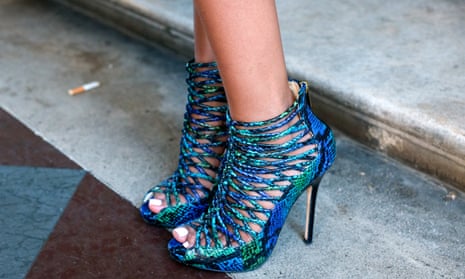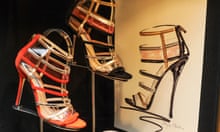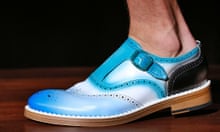Jimmy Choo, a British luxury brand whose fans include Beyoncé and the Duchess of Cambridge, has been snapped off the shelf for £896m by US fashion brand Michael Kors.
Famed for its strappy stilettoes, which sell for up to £2,995, the brand was founded in a Hackney workshop in east London in 1996 by the Malaysian shoemaker Jimmy Choo, after his designs caught the eye of then Vogue accessories editor, Tamara Mellon.
It shot to fame a few years later thanks to the fictional character Carrie Bradshaw in television series Sex and the City. Today, the firm runs 150 of its own stores around the world and a further 60 franchise outlets where and sells bags, perfume, trainers and hats as well as its shoes.
The acquisition by Michael Kors, which is expected to be finalised this autumn, marks the fourth time Jimmy Choo, which listed on the London Stock Exchange less than three years ago at a value of £545.6m, has changed hands.
Both Choo, who reportedly made his first pair of shoes at 11, and Mellon left after a string of private equity firms took control of the business. Choo sold his 50% stake in 2001 and Mellon departed in 2011 when JAB Luxury bought the firm for more than £500m.
After a somewhat acrimonious departure, Mellon last year unsuccessfully sued her former employer for millions of pounds in damages claiming it had tried to sabotage her new business, a luxury footwear bearing her own name, by allegedly trying to prevent its suppliers from producing her designs.
Jimmy Choo’s majority shareholder JAB Luxury, the investment arm of Germany’s billionaire Reimann family, put the firm up for sale in April. JAB is selling its 67.6% stake to focus on its food and consumer goods investments, which include doughnut maker Krispy Kreme and coffee brands including Douwe Egberts.
The footwear brand’s chief executive, Pierre Denis, a former LVMH executive who has run the company since 2012, will stay on, alongside the creative director, Sandra Choi, who has been with the firm since the beginning, and the finance director, Jonathan Sinclair. Denis will make £6.2m from his shareholding, while Choi gets £2.2m for her stake. Peter Harf, the chairman, will receive £2.1m for his.
Analysts said the deal would add prestige to Michael Kors, a more affordable upmarket brand, helping it move into the higher echelons of the global market. For years the American brand, which sells shoes, eyewear, watches, jewellery and perfume, was one of the world’s fastest-growing fashion labels but sales have slipped recently.
John Idol, chief executive of Michael Kors, said: “Jimmy Choo is known worldwide for its glamorous and fashion-forward footwear. The company is a leader in setting fashion trends. Its innovative designs and exceptional craftsmanship resonate with trendsetters globally.”
Jimmy Choo said it hoped the new backers could help it grow to become a $1bn brand, partly by expanding its more recently launched accessories and men’s footwear businesses.
The company achieved sales of £364m in 2016 as it continued to shrug off the slowdown in Asia experienced by many luxury brands. But pretax profits slid nearly 20% to £17.7m, as sales in the US were hit by the decline of department stores and the falling value of the pound which pushed up costs.
Jonathan Buxton, head of consumer and retail at Cavendish Corporate Finance, said: “Jimmy Choo is a widely popular footwear brand but like so many upmarket brands, it has been facing declining sales due to discounting in department stores and customer preferences moving away from conspicuous labels.
“For Michael Kors, this deal presents an opportunity to enter the high-end of the luxury market, to increase sales and to diversify away from its own brand.”
Honor Strachan, a retail analyst at GlobalData, said the deal could also bring stability to Jimmy Choo after a string of different private equity owners.
“The company has been passed around quite a lot. For Jimmy Choo this is a chance to finally have an owner that specialises in luxury retail and has the logistics and expertise in that market and can support it to expand internationally,” she said.
Jimmy Choo shares closed up 17% to 228.25p after City investors responded positively to the takeover deal. The business floated on the London stock market at 140p a share in 2014, valuing it at £550m.

‘Jimmy Choo 2017 is not Jimmy Choo 2004’
Once upon a time, Jimmy Choo was a byword for posh footwear. The brand came of age during the paparazzi years, a colourful time of Paris Hilton and Sex and the City and showstopper high heels. A few pairs spring to mind: the suede and feather platform worn (and lost) by Carrie Bradshaw in an early episode, the notable zebra print boot – the first worn on the red carpet in the US – and Princess Diana’s purple flats.
Though a powerhouse of the noughties and the go-to reference for red carpet footwear, calling the footwear label highly fashionable now, in 2017, would be a stretch. Other labels have moved with the times, and had fun rebranding. Footwear design has become so experimental that the most-talked about styles tend to come from full service labels rather than footwear brands – see Gucci’s infamous furry loafers, and Balenciaga’s avant garde thigh high stocking boots. Heels no longer dominate the catwalk, either – flats, trainers and ugly pretty shoes are in vogue. Jimmy Choo still make bejewelled sandals which are classic or staid, depending on where you sit, but remain a far cry from the zeitgeist. Jimmy Choo’s impractical shoes necessitate an expensive lifestyle and this sort of showiness isn’t terribly hip.

In fashion terms, this decline has been happening gradually. The departure of Tamara Mellon who transformed the brand into a luxury king before leaving, acrimoniously, with a payout in 2011. Being floated on the London stock exchange in 2014 … it was a case of Trigger’s Broom. Jimmy Choo 2017 no longer means Jimmy Choo 2004.
Perhaps this sale tells us more about Michael Kors – the American label whose sales were battered after taking on an ambassadorial role as label du jour of “basic”, a pejorative term associated with the mainstream. Though lacking in hipness, Jimmy Choo still carries some weight. They are still worn by Kate Middleton, and still arguably dominate the red carpet so it makes sense that a label like Michael Kors – more affordable, often discounted – would want a stake in them.
Dominating the red carpet doesn’t equate to dominating the catwalk but it does give an awful lot of exposure to a brand. So, if you’re going to invest in a pair of heels (and at around £500) then Jimmy Choo still has gravitas in that market.
Morwenna Ferrier








Comments (…)
Sign in or create your Guardian account to join the discussion